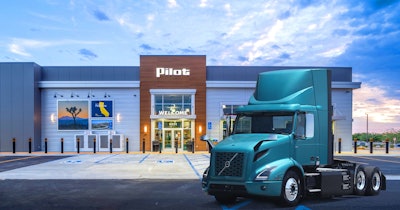
NATSO, the trade association representing truckstops and travel centers, and SIGMA: America's Leading Fuel Marketers have asked the White House Office of Management and Budget (OMB) and the Environmental Protection Agency (EPA) to increase the blending mandate for biodiesel and renewable diesel under the Renewable Fuel Standard.
The associations, representing more than 80% of retail fuel sales in the U.S., also encouraged EPA to remove its proposed e-RIN program from its final Renewable Volume Obligations for 2024, and instead revise that program to allow EV charging station owners and operators to leverage e-RINs to make investments in charging stations more attractive.
NATSO and SIGMA have been meeting with the White House and the OMB over the last several weeks on these issues. During those meetings, the associations encouraged EPA to separate its e-RIN proposal out of the 2024 program and instead pursue an e-RIN program that integrates public charging stations in time for the 2025 compliance year. Senators Chuck Grassley (R-Iowa), and John Cornyn (R-Texas) last month introduced a bill that would prevent electric vehicle manufacturers from participating in the Renewable Fuel Standard and have the EPA withdraw its e-RIN program.
"By separating e-RINs from its upcoming RVOS, the agency can rework its original proposal and ensure that e-RIN policies encourage private investment in electric vehicle charging stations," said David Fialkov, Executive Vice President of Government Affairs for NATSO and SIGMA. "Investments in DC fast chargers are not projected to be profitable for many years. Taking the time to revise the e-RIN proposal to incorporate charging stations will help overcome the market challenges that are depressing private investment in charging infrastructure, helping the Administration to reach its goal of 500,000 EV chargers."
NATSO and SIGMA also encouraged the agency to increase the total advanced biofuels mandate by at least an additional 250 million gallons for each year to accommodate the additional renewable diesel that is being introduced into commerce.
"Biodiesel and renewable diesel represent the most viable near-medium term option for decarbonizing the trucking sector," Fialkov said. "EPA should encourage additional investments in these fuels. Raising the total advanced mandate by at least 250 million gallons above and beyond what was proposed would be a step in the right direction."



![Westport’s High Pressure Direct Injection display at ACT Expo earlier this month attracted plenty of attention. Westport, which advertises the system for natural gas and hydrogen engines, states on its website that “HPDI with 40% biomethane delivers the same life cycle CO2 reductions as fuel cells using blue/green hydrogen blends, and can deliver zero [well-to-wheels] CO2 with pure biomethane.”](https://img.ccjdigital.com/files/base/randallreilly/all/image/2023/05/Westport_HDPI.6477811b5137f.png?auto=format%2Ccompress&fit=crop&h=167&q=70&w=250)








